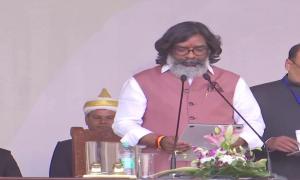Richard Armitage, former United States deputy secretary of state, did not 'threaten to bomb Pakistan back to the Stone Age' unless it joined the fight against Al Qaeda, but he did 'drop the hammer on them,' according to ex-CIA chief George Tenet.
Tenet's remarks in his book were in contrast to Pakistan President Pervez Musharraf's statement that Armitage had threatened to bomb the country 'back to the Stone Age.'
Tenet recalls that on September 13, 2001, two days after the 9/11 attacks, Armitage invited Pakistan's Ambassador Maleeha Lodhi and the-then Inter-Services intelligence chief Mahmood Ahmed, who was in Washington, to his office 'and dropped the hammer on them.'
'Armitage is a bull of a man. Mahmood must have felt like he had been run over by a stampede by the time he left Rich's office,' writes Tenet, observing, 'I seriously doubt, however, that Rich actually threatened to bomb Pakistan back to the Stone Age, as Mahmood reportedly told President Pervez Musharraf.'
Tenet, the CIA boss who resigned following a controversy over the Iraq war, described Mahmood as a man who sympathised with the Taliban and tried to defend Mullah Omar in the meetings he had with the former ISI chief, Dawn reported.
Mahmood, he claimed, opposed the US military action against Taliban and suggested 'bribing key Taliban officials' to get them to turn over Osama bin Laden, the chief suspect in the 9/11 terrorist attacks.
'He made it clear that neither he nor his service would have anything to do with the (US) effort (against the Taliban), not even to the extent of advising us whom we might approach.'
But, Tenet, said being in US when the attacks occurred probably had the greatest influence on Mahmood.
'He (Mahmood) saw the plume of smoke rising from Pentagon. He watched reactions all around him, and he understood, as he never could if he had been following events from Islamabad, how deep and viscerally Americans felt the attacks,' Tenet says.
Although Mahmood was still trying to save the Taliban, 'he knew that if we did not get satisfaction, we were still coming after Al-Qaeda, no matter who objected or who tried to stand in the way,' Tenet was quoted as saying by Dawn.
That is why, Tenet says, Mahmood finally agreed to meet Mullah Omar when he returned home. The Taliban supremo, however, still refused to hand over Osama, 'but across the border in Pakistan, Pervez Musharraf clearly got the message we were sending him and, I can only assume, the message General Mahmood sent to Pakistan immediately after the attacks.'
'Within hours of Armitage's delivering his ultimatums, and despite some violent internal opposition, General Musharraf agreed' to support the US offensive.
In his meeting with Mahmood and Lodhi, Tenet says, Armitage demanded that 'Pakistan begin stopping Al-Qaeda agents at its border, grant the US blanket over-flight and landing rights for all necessary military and intelligence operations, provide territorial access to American and allied intelligence agencies, and cut off all fuel shipments to the Taliban.'
'On October 8, as final measure of his determination to aid America in rooting out Al-Qaeda, Gen Musharraf replaced Mahmood Ahmed as head of the ISI, even though he had been instrumental in General Musharraf's rise to power.'
'Like us, Musharraf must have concluded that in the new global reality, his intel chief was just too close to enemy. Whatever the reason, I have always considered General Musharraf's reversal to be the most important post-9/11 strategic development after the takedown of the Afghan sanctuary itself.'








More from rediff